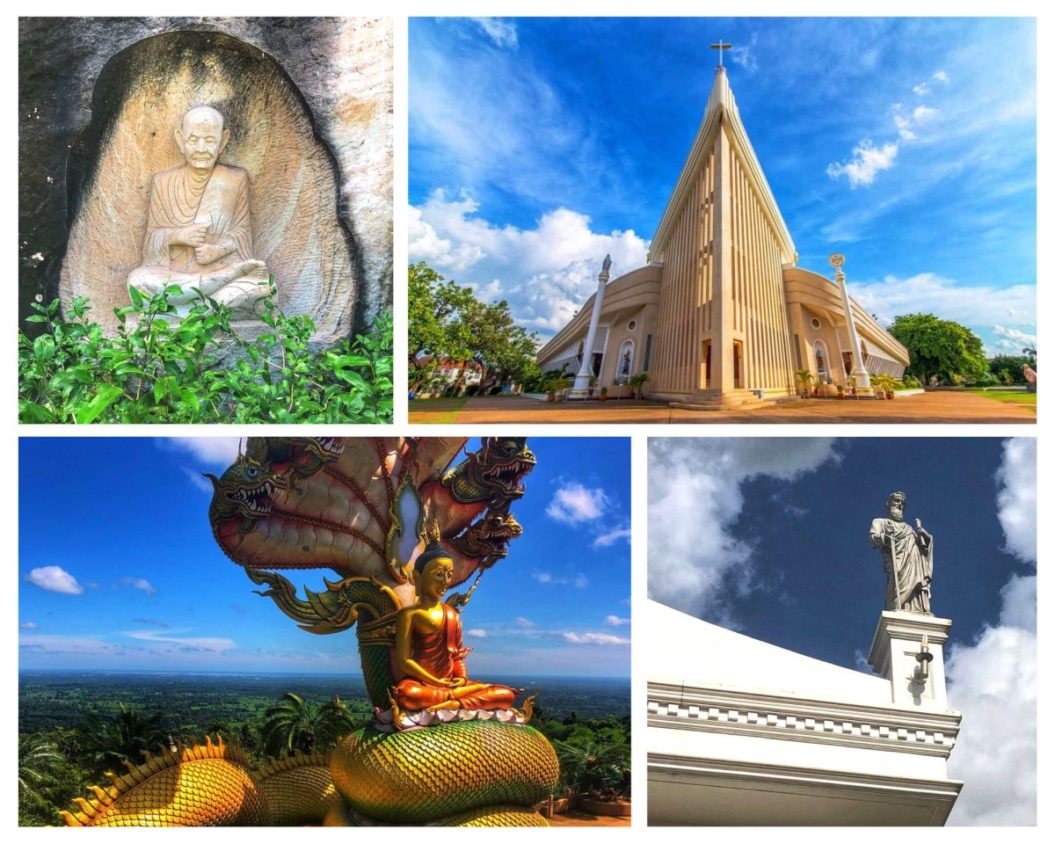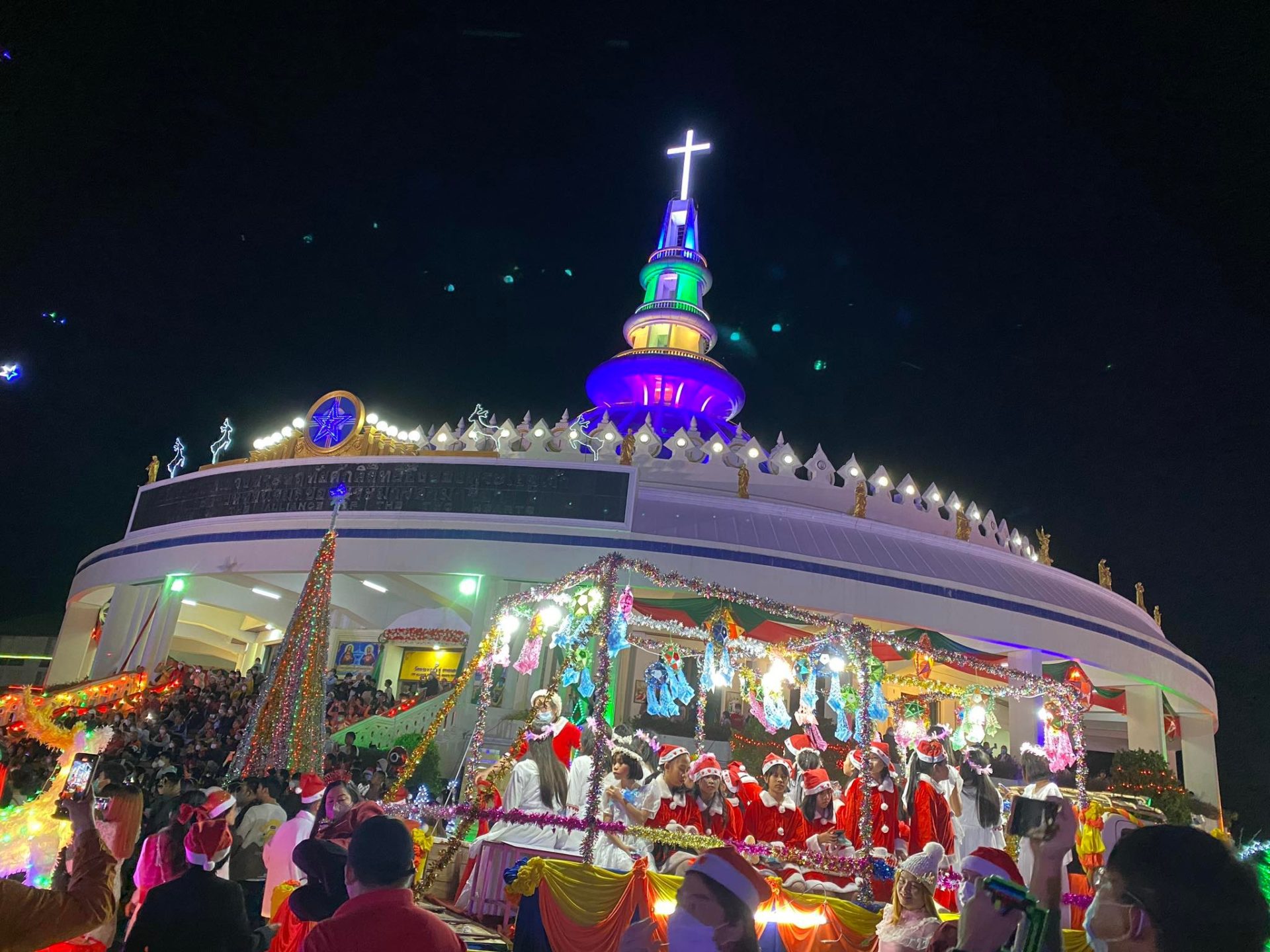Buddhism and Christianity in Thailand – Religious Similarities

While Buddhism is the National Religion of Thailand, with 92.5% of the population identifying as Buddhists, the Christian religion has a strong (albeit small) presence in the Kingdom. There are close to a million Catholics and Protestants in Thailand (or 1.4% of the population), with Catholics making important contributions to Thai education, operating over 300 schools in Thailand and 2 universities, whose students are predominantly Buddhists.
The relationship between the Buddhists and Christians in Thailand has long been one of mutual respect, friendliness, and helpful service. This solid friendship can be seen especially in the Northeastern province of Sakon Nakhon. This rural Isaan province is home to the largest Catholic community in Thailand (in the sub-district of Ban Thae Rae). The Christians here have blended in seamlessly with their Buddhist neighbors.
Every year at Christmas time, Buddhists and Catholics alike enjoy the beautiful Christmas lights adorning Ban Tha Rae homes, as well the Star Procession which has become the most famous Christmas Parade in Thailand. A few Catholic churches have adopted architectural motifs from Buddhist temples, and occasionally one will see a Christian motif on display at a Buddhist temple in Sakon Nakhon.

Religious Similarities Between Thai Christians & Buddhists
One reason why Buddhists and Christians have gotten along so well in Thailand is that there are many similarities between the Dharma of the Buddha and the teachings of Jesus Christ, and likewise those Thais who follow these two religions with devotion. In Thailand, the Buddha is referred to as Phrá Phút-tá-jâo (พระพุทธเจ้า) and Jesus is referred to as Phrá Yay-soo (พระเยซู). Buddhists are called Chao Phút (ชาวพุทธ) and Christians are called Khon Khrit (คนคริสต์). Some of the most prominent similarities between the two faiths are as follows:
Compassion and Love: Both Buddhism and the teachings of Jesus Christ emphasize the importance of compassion and love towards all living beings. They advocate treating others with kindness, empathy, and unconditional love. This teaching feeds into the Thai characteristic of being “greng jai“.
Buddha: “Radiate boundless love towards the entire world.” – Karaniya Metta Sutta
Jesus: “Love your enemies, do good to those who hate you.” – Luke 6:27
The Power of Thought and Positive Mindset: Both Buddhism and Christianity emphasize the significance of thoughts and the impact they have on one’s life and well-being. They encourage cultivating a positive and virtuous mindset to lead a fulfilling and meaningful life.
Buddha: “We are what we think. All that we are arises with our thoughts. With our thoughts, we make the world.” – Dhammapada 1:1
Jesus: “But the things that come out of a person’s mouth come from the heart, and these defile them. For out of the heart come evil thoughts—murder, adultery, sexual immorality, theft, false testimony, slander.” – Matthew 15:18-19
Both the Buddha and Jesus point to the idea that our thoughts shape our actions and experiences. The power of thought can lead to positive transformation and a life characterized by love, compassion, and wisdom. Conversely, negative thoughts can lead to destructive behaviors and a sense of disconnection from oneself and others.
By recognizing the influence of our thoughts and cultivating a positive mindset, we can work towards personal growth, inner peace, and a more harmonious relationship with the world around us. This teaching was often shared by King Bhumibol Adulyadej the Great of Thailand, who was greatly revered by both Thai Buddhists and Christians.
Humility and Selflessness: Both the Dharma and the teachings of Jesus emphasize humility and selflessness as virtues. They teach the value of putting others before oneself and avoiding pride and arrogance. This teaching plays a role in Thailand’s face-saving culture.
Buddha: “Do nothing out of selfish ambition or vain conceit. Rather, in humility, value others above yourselves.” – Dhammapada 223
Jesus: “But many who are first will be last, and the last first.” – Mark 10:31
Non-Attachment and Detachment: Buddhism and Christianity caution against excessive attachment to worldly possessions and desires. They promote inner freedom and detachment from material things. This contributes, at least in part, to the Thai people’s “mai pen rai” attitude, and the virtue of being “jai yen” (calm and cool hearted).
Buddha: “Attachment leads to suffering.” – Majjhima Nikaya 11.22
Jesus: “Do not store up for yourselves treasures on earth, where moths and vermin destroy, and where thieves break in and steal.” – Matthew 6:19
Turning Away from Violence: Both the Dharma and Jesus’ teachings advocate non-violence and the peaceful resolution of conflicts. They promote a message of harmony and avoiding harm to others. Again, this was a theme often hit upon in the Royal Speeches of His Majesty King Bhumibol Adulyadej of Thailand.
Buddha: “Victory breeds hatred. The defeated live in pain. Happily, the peaceful live, giving up victory and defeat.” – Dhammapada 201
Jesus: “Put your sword back in its place, for all who draw the sword will die by the sword.” – Matthew 26:52
Mindfulness and Awareness: Both Buddhism and Christianity emphasize the significance of mindfulness and present-moment awareness. They encourage living in the present, free from excessive worries about the future or regrets about the past.
Buddha: “The past is already gone, the future is not yet here. There’s only one moment for you to live, and that is the present moment.” – Dhammapada 348
Jesus: “Therefore do not worry about tomorrow, for tomorrow will worry about itself.” – Matthew 6:34
Generosity and Charity: Both the Dharma and the teachings of Jesus encourage acts of generosity and charity to alleviate the suffering of others.
Buddha: “Conquer the miser with generosity. The liar with truth.” – Dhammapada 223
Jesus: “Give, and it will be given to you. A good measure, pressed down, shaken together and running over, will be poured into your lap. For with the measure you use, it will be measured to you.” – Luke 6:38
- Affirmations in Buddhism & Thailand - June 7, 2025
- Speak Thai Naturally Without the Gymnastics - April 20, 2025
- The Best Learn Thai Podcast and YouTube Channel - April 10, 2025




